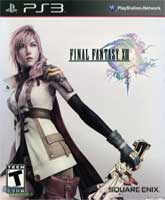 Review by Steerpike
Review by Steerpike
Developer Square-Enix
Publisher Square-Enix
Released March 9, 2010
Available for PS3 (version played), 360
Time Played 91 hours, 17 minutes, 38 seconds
Verdict:  4/5 Thumbs Up
4/5 Thumbs Up
“Final Fantasy XIII’s real triumph is its incredibly nuanced, sophisticated battle system. The rest is comparatively standard JRPG fare – not bad, but not to everyone’s taste.”
It Will Probably Take You that Long to Read this Review
Any game I play for 91 hours, 17 minutes, and 38 seconds must have something going for it. I’m so easily distracted, and so short on time, that often even truly outstanding games fall away after just a handful of hours. It’s genuinely rare that one holds my interest this long. This alone is enough to warrant the score I’ve given Final Fantasy XIII.
Nearly every complaint you’ve heard is accurate: linearity, certain annoying characters, its distinct Japanese-ness. And in part because of this it got only moderate critical praise in the West, where more and more, gamers are railing against the traditional linear storylines and, well, Japanese-ness of JRPGs. Not because we have anything against Japan, but because of the clash between the style of JRPG and western RPGs. This game sold a bazillion copies of course, because it’s Final Fantasy, and I think even its harshest critics would agree that it’s not a bad game. It’s just very much a JRPG, and JRPGs don’t sit well with everyone. Frankly they don’t sit that well with me; I was raised on them but I’ve definitely drifted away from the genre. I can’t get into most of them.
And yet here I played Final Fantasy XIII, the epitome of JRPG, for 5,478 minutes (rounding up), and enjoyed easily over 90% of them.
Still, if you dislike JRPGs this one isn’t going to change your mind. It’s the most anticipated, most hyped, most widely pimped game in the series history, except maybe for Final Fantasy VII, but unlike that one it actually doesn’t really innovate or change things. This, too, I believe is the cause of some disappointment. It has one thing that I think nearly anyone would enjoy: Final Fantasy XIII’s real triumph is its incredibly nuanced, sophisticated battle system. The rest is comparatively standard JRPG fare – not bad, but not to everyone’s taste.
God Gave Us the Apostrophe for Two Reasons
(possession and contraction. not plural, not “just in case,” not for ridiculous fantasy-sounding words. possession and contraction. nothing else).
JRPGs tend, naturally enough, to parallel anime and manga in many areas: art, androgyny, completely nonsensical storylines. I’ve seen my share of anime and the vast majority doesn’t make any sense at all by the end. I don’t know if this is a Japanese thing or if it’s an anime/manga thing, but it bugs me. I like closure. I like closure that makes sense.
But Final Fantasy XIII’s story, to my surprise, is not at all confusing. Nor is it bad. Nor is it good. I’m uncertain whether I’d prefer a bizarre but compelling storyline, or a completely followable storyline that should be a lot better than it is. The general concept is pretty cool, with interesting themes, interesting characters, and a unique plot. It’s hardly the worst-written or scripted RPG out there, it just lacks a certain… oomph. The passionlessness of the manner in which the tale is spun reduces its impact.
The world of Cocoon – sort of a hollowed-out shell that people live inside – orbits a much larger planet known as Pulse. Citizens of Cocoon live in fear of Pulse; the humans down there have attacked the humans above many times, and the last assault left the artificial structure seriously damaged. Vestiges from that attack still litter Cocoon, which never fully recovered. The government spends a lot of time fearmongering about Pulse, and the culture is highly militaristic.
People are not alone on these two worlds. They coexist with creatures called Fal’Cie (seriously? THE APOSTROPHE IS NOT A TOY) much the same way you or I coexist with our pets; except in this case, the humans are domesticated. These beings take all shapes and sizes and often don’t look or act like organisms at all. Nor do they communicate with human beings, but the people of Cocoon depend on them for everything – there’s a Fal’Cie that purifies water, one that glows like a little star so it’s bright inside Cocoon, one that makes food, and so on. In fact, the Fal’Cie built Cocoon and moved a bunch of people there from Pulse thousands of years ago, but no one really knows why, and in a trend that rapidly becomes a core theme of the game, no one asks.
It’s best to leave Fal’Cie alone, because when they need something done, they can brand a human with a special mark that turns them into a l’Cie (GOD DAMMIT), essentially a slave. L’Cie must carry out a specific task within a specific time or they transform agonizingly into horrible, suffering abominations. When you get made into a l’Cie, they don’t tell you what your task is or how long you have to complete it. A Fal’Cie could theoretically turn a person into a l’Cie just to go get them dinner… or they could do it for some earth-shattering reason. You could have years or minutes to complete the task. And even successful completion doesn’t mean a good ending: l’Cie that complete their “focus” turn to crystal on the spot.
Becoming a l’Cie is a Very Bad Thing on Cocoon. L’Cie are thought to be agents of Pulse, so even people suspected of being one are arrested and purged, which is to say they’re sent down to Pulse where they presumably die. Others are used for secret government experiments. Most l’Cie lead very short lives, entirely on the run. So when one of the vestiges from that last attack begins exhibiting odd, Fal’Cie-like behavior, the government freaks out and decides to purge the entire neighborhood.
During the confusion of the Purge, six people thrown together by accident get turned into l’Cie. Now, despised by their entire world, pursued by their own government, and with absolutely no idea what they’re supposed to be doing, these six have only each other, which sucks for them because they mostly hate one another.
I’ve created this helpful pictorial reference for you. The rainbow-colored gauge next to each character description indicates how insufferably irritating they are on the Official JRPG Scale of Insufferably Irritating, green being least irritating and red being want-to-stab-them-in-the-face irritating:
So aside from the apostrophes it sounds okay, right?
Spoiler Alert
Sadly, much like anything I write, it takes forever to go anywhere, and once it gets there it doesn’t do all it could have with what it’s got. We’ve all lamented the fact that we just don’t have the time to devote hundreds of hours to RPGs these days, even though we might like to. And the truth is Final Fantasy XIII makes itself into a hundreds-of-hours RPG when it’s not necessary.
The fundamental revelation is that the Fal’Cie have been deserted by their god and want him back. Summoning this deity naturally involves a sacrifice… and by the Fal’Cie’s (see how stupid that looks? JESUS) estimation, a couple million people should do it. So they build Cocoon and pop some people into it to act as the sacrifice. But then, when the moment finally comes, they find they can’t bring themselves to do it. It would be like killing your own cat. They want to, they know they can, but they aren’t… quite… able to pull the trigger themselves, as it were. So they use l’Cie to do it for them.
All that is pretty smartly done, but you don’t find out about it until like 30 hours in. Until then these six just bicker and try to get away from each other. After you discover the crux of the narrative, they sort of wander around trying to decide whether it’d be worse to fulfill their focus and destroy the world or not fulfill their focus and become disgusting monsters, or some mysterious third alternative that involves doing neither and that each of them variously clings to or derides as impossible as they evolve throughout the game. I didn’t find the game particularly badly written, just badly paced.
It may surprise you to find that after 91 hours, 17 minutes, and 38 seconds of play I still haven’t reached the end. Final Fantasy XIII is a very, very long game, and it just didn’t need to be. I will eventually complete it, because I want to find out what happens, but despite it holding me for this long I’m finally drifting. This is due largely to the sense of irritation I was beginning experience as I realized how much unnecessary filler there was.
I can get interested in a story if it fulfills certain indescribable criteria for me, even if it’s not really great in any sense of the word. That’s the case here. For whatever reason I was intrigued enough by the fiction of the game and curious enough about the fates of the characters to continue despite recognizing pretty early on that the story makes some amateurish mistakes. Oh, sure, some of it is quite good, and some moments of dialogue are actually priceless:
SAZH: Run!
[Lightning draws her sword and races toward the monster]SAZH: I meant AWAY!
And I definitely liked some of the characters, particularly Lightning and Sazh, the only two emotionally mature (if deeply troubled) characters in the entire game. But for the most part the story meanders. Subordinate characters appear and disappear, villains materialize and are defeated, betrayals occur, understandings are reached, locations are visited, things turn into other things, friendships are kindled, maturations achieved, etc etc etc. But it’s like… get on with it already. Final Fantasy XIII would have benefitted greatly from an aggressive tightening.
Strategeries
Story kept me playing, but what kept me really enraptured, aside from the eye-gougingly beautiful Crystal Tools Engine, is the combat. Oftentimes combat becomes a chore in JRPGs, but in Final Fantasy XIII, it’s a game in and of itself. And it’s a game of such uniqueness, nuance and sophistication that some people probably don’t even realize the level of complexity and challenge it allows.
Rather than directly controlling actions in the turn-based system, you’re all about Big Picture Management, coordinating the activities and general posture of your battle team (typically three of the six party members). By assigning specific roles to individual team members, then saving combinations of these roles as “Paradigms,” then swapping between them as needed during a fight, combat is a tactical exercise rather than a direct challenge of micromanagement.
To some degree there are great similarities between the combat in Dragon Age and that in Final Fantasy XIII, though in the former case preprogrammed strategies aren’t really the best way to play the game. In the latter, it’s not the only way to play, but it is the right one. It’s a different way of doing things, and it’s very rewarding. Though decidedly turn-based, it captures the freneticism and simultaneity of combat easily as well as Dragon Age does, while forcing you to think like a tactician rather than a direct combatant.
Thus the challenge is of optimizing battle team builds and role combinations, studying foes for weaknesses, scrutinizing combos and attack chains, determining ideal paradigms, and – most importantly – switching among them during combat itself. A casual observer might think that the player is simply “watching” combat in Final Fantasy XIII. This is not remotely true, at least not if you’re playing right. You must order paradigm shifts constantly, you must time them perfectly, and most of all you must know what you are trying to accomplish. Everything is happening at once and if you’re not focused on the big picture the confusion will overcome you. Just staying on a single paradigm and bashing away is a recipe for disaster. There is no perfect build, because the battlefield is protean. In some fights even a single mistake or missed opportunity will cost you the game. Victory requires careful weaving of paradigm shifts in quick succession to build up the maximum combo damage to “stagger” your opponent, at which point they’re essentially helpless for a short time and you can really whale on them. This, of course, means that you have to understand each opponent and how to fight them. It’s quite extraordinary, the difference strategy can make in fights against identical foes. There may be several right ways – or at least several ways to achieve victory – but some are much faster and much more effective than others. The same battle can take ten seconds or ten minutes, be an easy win or an easy loss, based on the tactical decisions you make.
Since you only get six paradigm slots, since characters will only act within their assigned role until you switch to a paradigm that has them doing something else, since you’ve got a maximum of three active battle team members, you’ll never have everything you want. There’s a bit of chess to it too, with openings and gambits and stratagems. Annoyingly, you don’t get complete control over your battle team until fairly late in the game, though this does put you in a position where you basically have to work with all the characters at some point or another even if you hate them.
If there is a drawback to Final Fantasy XIII’s battle system, it’s that it forces you to fly by instrumentation most of the time. HUD items, health meters, action meters, stagger meters, timers, cooldowns; these are the tools that suggest your next paradigm shift. And combat is so fast you can’t take your eyes off them. You can order paradigm shifts whenever you want, but the window to do it right is often very narrow – a second, sometimes, even less. A single error is all it takes, shifting too soon or too late, picking the wrong paradigm; you’ll be dead in an instant.
The reason this is bad is that the combat is so beautiful to watch, but you can’t. You glance away from the status information for a split second and you’ll miss some key event that would otherwise dictate a paradigm shift. While the HUD is easy to read, it is all-consuming in terms of your attention. I’d much prefer that they managed to incorporate more in-game visual elements to help you determine the status of combat: more injury animations, more obvious real-world stuff, like a commander on the battlefield must depend on. By just throwing dozens of ever-shifting numbers at you, they shortchanged their own otherwise quite brilliant creation.
What He Said
The biggest complaint most reviewers had about Final Fantasy XIII was that it was very, very linear. This is true. For the first… oh, about 15-30 hours, depending on how fast you go, you only have one path. During this time Lightning and her frenemies run all over Cocoon, mostly trying to escape from the government. Even traditional Final Fantasy staples like towns have been removed. No side quests, no exploration, no diversions.
You sort of get used to it. The only reason people complained was that it’s an RPG. Gears of War is linear and no one minded – though to Gears’ credit, it knew when to wrap things up and did so in a much timelier manner. Still, to me, the bigger offense Final Fantasy XIII commits is not that it’s linear, but that it clumsily tries to go nonlinear later on.
Almost without warning your whole party goes down to Pulse, then presto – the world is open. And mighty disorienting. Not only are you used to the linearity by this point, but when I say open I mean open, in that you’re looking at a vast rolling countryside with few memorable landmarks for navigation. You can’t even use the map, because instead of having a “north,” like any respectable map would, it rotates so “up” is just the direction your party is facing.
All of a sudden there are hundreds of hunt-down-and-kill side quests spread out over this immense territory, and it’s immediately evident that the whole purpose of this section – which can easily tack 100 hours to your playtime if you allow it – is so you can grind up to the point where the final stages are possible. It’s also around this eleventh chapter (of 13) that the game gets unbelievably hard, with foes capable of taking you down in a single swipe. Only by maxing out every character on the game’s interesting (if also linear) 3D role-improvement web can you hope to proceed. But these opportunities are meted out stingily, and frankly any game still introducing completely new play mechanics at the 40-hour mark is suffering from pure bad design.
Except Big Bird, He’s Okay
Another turn-off for me was that while Final Fantasy XIII removed many staples that series purists wanted, it included many others that I could have personally done without.
Perhaps the greatest disconnect between western and Japanese cultures is humor. I don’t just find Japanese humor humorless, I often find it offensively, even embarrassingly, annoying. On those occasions when I’ve observed something Japanese employing a more western style of humor, I can really enjoy it. But the instant you get into bouncily peppy females and bizarre onomatopoeic emissions and weird face twitches and enormous yellow birds called Chocobos, you’ve lost me.
Final Fantasy XIII is a pretty blood-drenched story that covers a large spectrum of tragedy, from loss of parents to loss of siblings to loss of lovers. It covers a large spectrum of melodrama, from government lies to religious lies to the lies we tell our loved ones, and the lies we tell ourselves. It covers a large spectrum of humanism, from self-loathing to self-assurance to self-doubt, to the most obnoxious forms of misguided self-aggrandizement. IT DOES NOT NEED GIANT YELLOW BIRDS.
I get the need for comic relief, particularly in dark stories. But to my own western sensibilities it is so perennially misused in most Japanese fiction – and especially here – that I think someone must have missed a memo very early on in that culture. It is comic relief, meant to relieve instances of otherwise unbearable seriousness or tension. It is R2-D2 and C-3PO, not Jar Jar Binks. And while Final Fantasy XIII isn’t as bad as some offenders, it liberally applies a very Binksian humor to moments and characters that should be dead serious. This is, frankly, a serious game with serious themes and serious people involved with serious things. It is a cautionary tale about depending on things you don’t understand and a subtle indictment of blind quasi-religious faith. There is space for humor in it, but not the way it’s used. Indeed, some of the misuse of humor causes serious damage to the game’s narrative.
Take Vanille, arguably the most detestable character ever to poison a videogame. Vanille typifies the obnoxiously peppy Japanese giggle-girl character trope, dancing and bouncing and chirping while the fates of millions of people are in her hands. In fairness, Vanille behaves the way she does for a reason: she is hiding personal demons of fear and guilt behind this toxically cancerous façade of faux-joyous schoolgirlism. The actress who plays her in the English release is so shockingly annoying that I must believe she was directed that way. Thing is, for this to work, you need to have that breakdown, when it all comes apart for Vanille and her exterior shatters, displaying what she’s really feeling. And this must then be followed up with a genuine change in her behavior because she’s learned that faking herself out isn’t working. Well, Vanille does have the breakdown moment, but the instant it’s over she’s back to her squeaky self, not because it’s her nature but because it’s such a traditional and loathsome trait of Japanese comedy.
A great deal of Final Fantasy XIII is about how different kinds of people deal with the bad things in their lives. For this very character-driven approach to work, we need character evolution. But what we get is only enough to make it tolerable.
Lightning reinvented herself years before the game even began – losing her parents as a teen, she had to become the parent and care for her sister Serah without genuine adult guidance. She had to create her concept of adulthood, which involved reinventing herself as an adult – to the point of changing her name and adopting a new personality, a cold, distant, bitchy personality suitable for the needs of someone who’s got to be tough. As a young caregiver with sudden and unwelcome responsibilities thrust upon her, she denied herself happiness in lieu of assuring the same for her sister, and she turned herself into someone who doesn’t feel because feeling hurts.
But she does feel, of course. She certainly hates Serah’s fiancé Snow. Oh sure, she spouts a number of words about why, about how he’s irresponsible, how he’s dumb. But the fact is Lightning doesn’t hate Snow because of these things. While admittedly not Mensa material Snow is a decent human being, one who uses his own skills and talents to help others whenever possible. And he’s clearly devoted to Serah. So why hate him so much?
Because for Serah’s sake Lightning denied herself whatever she may have had of dreams or aspirations of her own. She hates Snow because Serah is happy, and that happiness has nothing to do with her sacrifice. She literally destroyed herself to become what her own at the time immature mind told her would be an effective parent-surrogate for Serah. She tried to become an unsuffering person, a visage of a human incapable of hurting because hurting hurts too much. She did this for her sister, and when that sister found joy – something Lightning can never find – in a cheerful, boorish, but ultimately good-hearted man, Lighting hated it. She burns with resentment for all she had to give up for Serah. Of course she hates the man who actually brings her happiness. Make no mistake; everyone in the universe hates the person who’s violating their little sister. But that’s not Lightning’s problem. Lightning’s problem is that she defines herself by misery, and that misery is measured against Serah’s. If Serah is truly happy, without Lightning’s input, something is cockeyed in the equation.
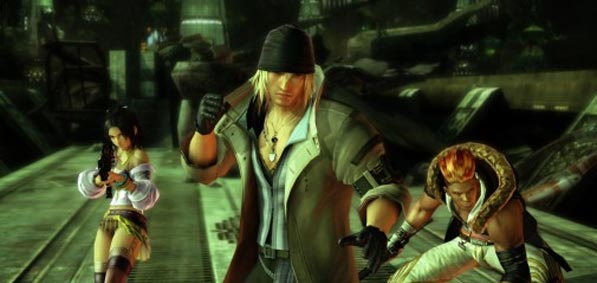
And in fairness to Lightning she does realize the error of her ways and does make nice with Snow. But what really needs to happen to Lightning is that same character-shattering moment Vanille undergoes, a moment when she realizes that her elaborate personality change is all just a form of hiding, and hiding isn’t helping anyone. Lightning hates herself. She hates herself for hating that Serah is happy with Snow, she hates herself for hating herself, she hates herself for not being tough enough to not care that she hates herself. We get that Lightning is a strong, intelligent woman who leads this ridiculous group and maintains a single-minded fixation on getting everyone out alive. We get her ability to overcome even impossible odds. We get all that. She’s a great example of a female character. She’d have been a greater example if we’d been given more time to experience her weaknesses as she experiences them, because all those paragraphs up there? I got them reading between the lines. It ain’t in the game.
People Are People So
A number of small, character-driven substories like this one exist within the larger framework of Final Fantasy XIII’s themes, and I’d rather they’d been a bit more thoroughly – and seriously – explored. Sazh’s loss of his son, for example, has all the makings of human tragedy, especially when coupled with a very deftly painted portrait of a loving (single) father who manages to do everything a parent should until tragedy turns his son into a l’Cie. Unfortunately, while Lightning is off-limits for humor, Sazh keeps one of those ever-fucking GODDAM YELLOW BIRD CHICKS in his hair. Really? Baby bird in the hair? You’ve got a father torn up by the loss of his son and you toss in comic relief by putting a baby bird in his afro? Logistical issues of bird shit aside, the humor itself is out of place.
And that is Final Fantasy XIII’s real narrative problem. It excised stuff considered canon in the Final Fantasy universe, while retaining stuff that I think everyone could have done without. I mean, the whole “thing” of Final Fantasy is that each game has no connection to the others – different worlds, different times, different characters. We won’t see Lightning again in Final Fantasy XV (XIV is an MMO). Why then do they feel a need to establish continuity with ridiculous humor rather than things people can sink their gaming teeth into?
Still, does it seriously impact the experience? Not really. The writing is middlin’-to-fair (that was meant to be a compliment) and nearly all of the English actors do a good job with their lines. Hearing actress Ali Hillis as the gruff, no-nonsense alto Lightning versus the ethereal Liara T’Soni (GOD FUCKING COCKLES CRAPPA GROWR) from the Mass Effect games demonstrates her reach. I must also give special props to Georgia Van Cuylenberg, the Aussie who plays Vanille and has been the subject of so much internet bile. Fact is, lady’s a talented actress and she’s playing the character as she was directed to. Vanille’s icepicks-in-the-brain peppiness is not Van Cuylenberg’s fault; she does what she can with a terrible, un-Western character who would never be well liked outside of that humor type.
No, the worst thing I can say about Final Fantasy XIII is that it focused on over-arching story when it should have focused on the characters. Given time and proper writing effort, even the most detestable could’ve been made into something more interesting.
On the Finality of Fantasies
91 hours, 17 minutes, and 38 seconds. That’s a long time. I never quantify games based on length any more. I’ve played some games for ten minutes and felt I got my money’s worth, and played others for hours and am still waiting for the payout. If Final Fantasy XIII has a disappointment, it’s that this game was hyped in such a way that audiences were expecting Final Fantasy VII-level innovation, and it’s clear that the team had no intention of breaking the mold that way. Final Fantasy XIII will not convert any player who dislikes JRPGs, but nor does it do any kind of serious damage to the genre.
What about the title? People ask me about the title when I say I’m playing Final Fantasy. It’s like when I mention the novel The Neverending Story. People all think they’re so fucking clever.
“So the story never ends? How will you finish it, yuck yuck?”
Final Fantasy XIII is neither the final nor the thirteenth in the franchise. The name comes from original creator Hironobu Sakaguchi’s fears, as he developed Final Fantasy for the NES, that it would be his last game. His previous efforts had sold poorly and he literally used all of Square’s remaining money to make their final fantasy. The rest is history.
Now that Final Fantasy XIII is also history I look back upon it with mostly happiness. I could have done without the Chocobos, sure. I could have done with more depth and darkness in the characters, but I always could do with more depth and darkness in the characters. And for all the complaints I’ve leveled, none of it changes a key fact… I played the god damned game for 91 hours, 17 minutes, and 38 seconds, and I’m not through yet. Your mileage may vary. Me? I got what I expected from it, if not what I wanted.
Email the author of this review at steerpike@tap-repeatedly.com.
Website: http://www.finalfantasyxiii.com/


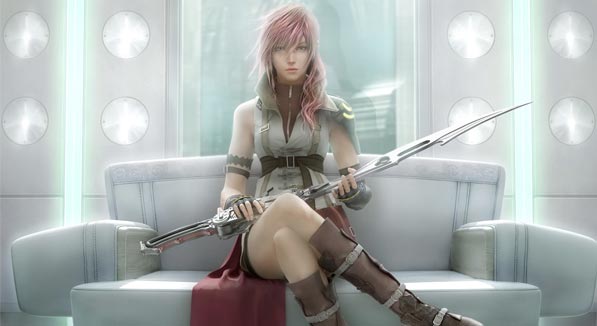
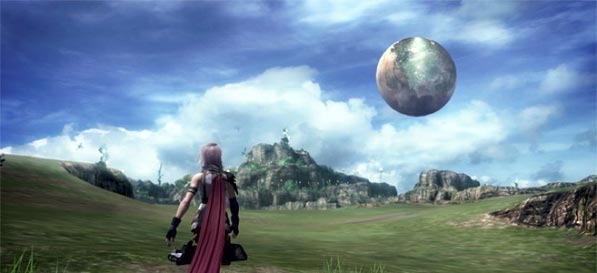
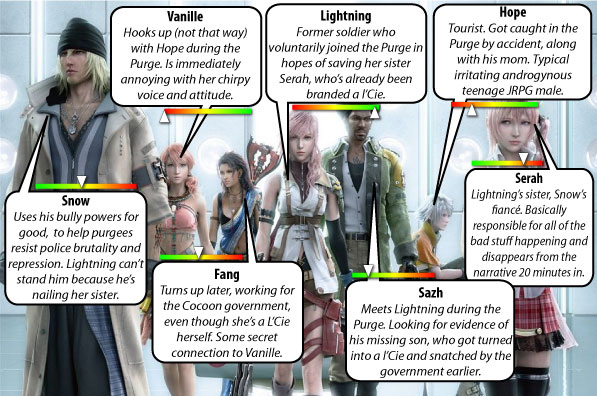
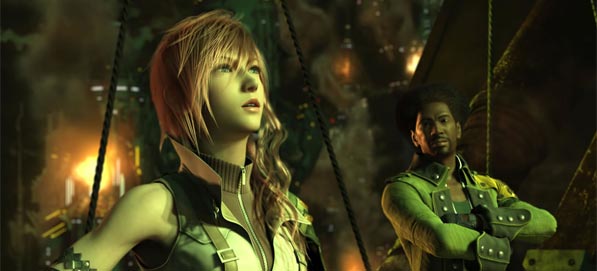
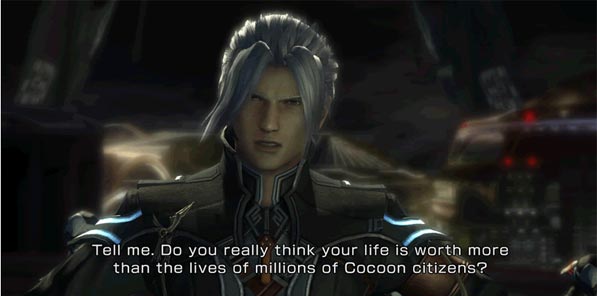

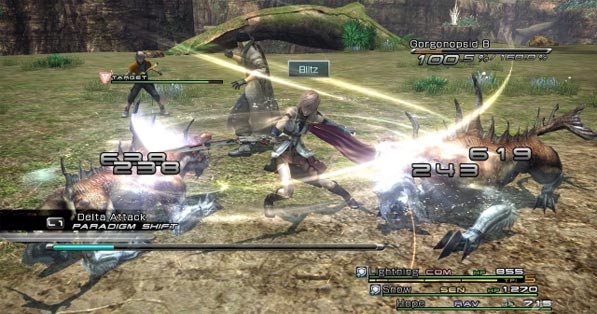
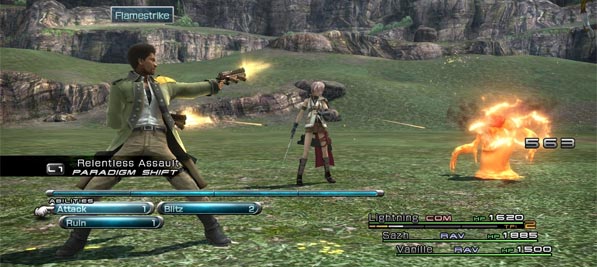


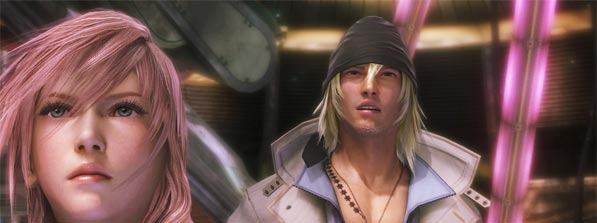
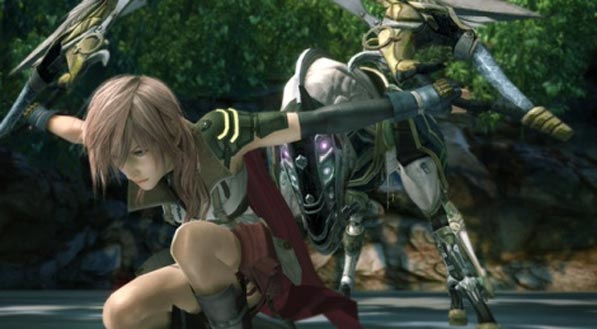
Great stuff Steerpike. Have you pasted in the wrong review score? 🙂 Nothing in your review suggests it should acheive anything more than 2/5.
I’ll have a second read through it, just incase…;)
Epic review, one that only settles me more into my boycott of all JRPGs. Venille would surely make me kill again.
And your indignant rage against rampant misuse of the “‘” (wow that looks SWEET) amuses me. Lovecraft must be given a pass on this one with his “R’lyeh” and his “Ph’nglui mglw’nafh Cthulhu R’lyeh wgah’nagl fhtagn.” He was trying to transcribe a horrible, unspeakable alien language. Maybe he was the first.
Maybe he’s to blame for all of the ”s (that’s two single quotes, just so you know I’m not abusing the ‘. Aigh! It’s inside the exclamation point! AIIIIIIIIIGGGGGGH F***ING FANTASY XIII!!!!!
POSSESSION AND CONTRACTION, NEVER PLURAL, ENGLISH TEACHER
R’lyeh isn’t English. It’s a phonetic translation of an alien language. DO NOT DEBATE WITH ME I AM LANGUAGE.
I wasn’t referring to R’lyeh, you doofus, but your use of two single quotes to pluralize one. Shame! Feel the shame!
These are the kinds of discussions we have here at Tap-Repeatedly.
You grammar bitches go on and on but probably drive like my mom. That’s a nice car sonny, but do you have to speed?
You wound me, Helmut. I am wounded. I drive like no one’s mom!
Good review, probably one of the better ones I’ve ever read of this game. Though, if you haven’t by now, you really ought to finish it. 🙂 The final dungeon area is so-so, but the last sequence of bosses is amazing. Also, you can reload your save afterwords and have access to the highest tiers of character advancement–if you enjoyed the sidequests, you should enjoy what comes with that.
Many speak (perhaps rightfully) of Hope and Vanille being annoying. It might just be because I hadn’t touched a JRPG or watched much anime in years, but I was able to ignore the stock characters on whom they were based. Taken completely on their own without any regards to that context, I was left with the following impressions:
Vanille – Weirdo who’s clearly hiding something. After that got blown out: just a straight-up weirdo. For whatever reason, I never thought of her as being particularly “cute”, just a space-case.
Hope – His early behavior was how I’d expect a child to act who just had their mother violently killed before their eyes and their entire world ripped apart. It’s not pretty, not pretty at all, but it was fairly realistic. As he gets over it, character development happens. In the end, he’s a little bland, but hardly unlikeable.
Now me, for whatever reason; my favorite character was Fang. She didn’t get the same development everyone else did, but her comparably limited screen-time did convey a great deal of personality–not just story-related dialogue and actions, but gameplay quotes, mannerisms, voice, and her overall look and feel. Then again, I suppose I’ll always enjoy the types of characters who prefer to fight first, question later.
Hi Mazed, thanks for the feedback.
In all honesty I wanted to go into more detail on my thoughts about the characters, but I get teased for my thousands of words reviews, and since this one was already pushing the 4K mark I decided it could wait. 🙂
I agree with you on Hope. His behavior is fairly realistic given what he’s been through; and he’s not outrageously annoying. I use him in my main battle team, actually, alongside Sazh and Lightning. My primary issue with Hope as a character is less that he’s annoying and more that JRPGs so perennially insist on including an androgynous young teenager who has no business being involved in any kind of world-saving activity. “What the hell is this kid doing tagging along with us” should have escaped the mouths of one of the more responsible adults in the group, but instead Lightning tolerates and even encourages him, which I felt was contrary to her nature.
Vanille I just wanted to beat. I wanted to beat her when she first turned up, I wanted to beat her whenever she spoke, I wanted to beat her whenever she appeared onscreen. In addition to being a terribly irritating character, her “big secret” was ineptly written and supremely obvious. Even if the sad-panda squeaks she emitted any time anyone mentioned Pulse hadn’t been evidence enough, the decision to saddle two characters with evident and matching accents didn’t exactly strike me as the most subtle way to advertise that she and Fang were from out of town.
As for Fang, I never really warmed up to her. I found Lightning’s bitchiness a little more real, a little less contrived, than Fang’s, and I never got much in the way of character development from her. She seemed one-dimensional to me; “protect Vanille” was basically her only character motivation, and since I hated Vanille and wanted her to die, I couldn’t really get behind Fang. The implication of tragedy in her life goes unexplored for so long that by the time you learn a little about her you don’t care any more… at least, I didn’t.
I fully intend to finish it, though I’m frankly disappointed in the level of grinding that will be necessary to finish that last chapter. In the end I decided to go ahead and do the review without finishing simply because even though there’s more to play, I’m confident I’ve seen all the game has to offer and can render a fair verdict.
I know a lot of people were disappointed by the game, and that’s not a reaction I can agree with. I had a lot of fun playing it. Had I been in charge, would I have done things differently? Sure… but all in all it’s a solid game that basically delivers on what it claimed. Ultimately I hope they’ll take the franchise in a more mature direction moving forward; right now it’s got one foot in the grown-up pool and one foot in the cotton-candy pool and the two just don’t work well together. If you want the series to be silly and childish, be silly and childish; if you want to go with these dark themes and complex characters, you gotta do it right.
“Silly and childish” works when you have an aesthetic to match. Of course, it should be pointed out that just because a story is silly, it cannot also have depth. Speaking in-series, FF9 pulled this off fairly well (though it could have also used some trimming down).
As far as FF13 goes, I was struck by how overwhelmingly *dark* the premise really was. With only a few seemingly-superficial tweaks to the aesthetic, the underlying horror could have been brought center-stage.
The same might be said for lots of stories, of course–the boundary between Adventure and Horror is pretty superficial–but in FF13 it struck me hardest (I’m sure I wasn’t the only person who was intensely creeped out playing through the entire Nautilus sequence).
Barthandelus, I should also mention, really shook me. That was a villain that I wish they had done a bit more with, because not since Kefka has this series had a primary antagonist be so vile on a level as personal to the protagonists. But..that’s a tangent waiting to happen. I digress!
Man, if you’ve done enough grinding to fill 90+ hours, by now you’ll be able to stomp the final battles flat–just remember your own observations about how split-second paradigm shifts are key. 🙂 (then after that, head back to Pulse and chew on the Faultwarrens for a while)
I wish that darkness had been more front and center. We’re talking themes of genocide, slavery, religious intolerance, anti-establishment terrorism, loss of parents and children… yeah, it’s a dark game. And one that needs a little comic relief – just not the kind that it included. Again, of course, my opinion.
The fact that the story was so spread out hurt things a bit. It took me a while to remember Nautilus when you mentioned it, and then suddenly I realized I was incredibly creeped out by the place as well. The Fal’Cie on parade, the sort of glazed happiness in the carnival city, it was disturbing. And that’s not even including Sazh and Vanille’s confrontation at the end. Hard stuff to watch.
Good review, Matt.
I’d love to offer comment, but really I can’t. It took me around 10-12 hours to lose patience with the game and I quit not long after. Every review I’ve read of FF XIII says the rewards are there if you’re willing to get through the opening 20+ hours of tutorials, but I just couldn’t hack it. I just hit a wall with the tutorials and being asked to learn such a lot over such a drawn out length of time just didn’t sit nice with my brain..
Fair play on the time you put into the game though. People will no doubt baulk when I sink that into Gran Turismo 5 from November onwards..
Thanks Mat, and you know, something I probably should have elaborated on further, was this game’s insistence on introducing new mechanics at such a slow pace.
Literally SIXTY HOURS IN, when you land on Pulse, up pops a tutorial window explaining how to manage side quests. Couple hours later, another tutorial window explaining the function of a new landmark you encounter.
Meanwhile the game never explains how weapon upgrades work, or whether there’s any logic to it, or what transformational catalysts do. That stuff I had to look up online.
To me, I enjoyed the opening half much more than the open world half, which I found disorienting, confusing, boring, unnecessarily lengthy, and pointless. It’s why I haven’t finished the game.
I wish you’d been able to get into it because I know you’re a great fan of Final Fantasy, but guess what? I understand exactly why you left the game behind. Still, I can’t bring myself to be too hard on it.
These days I just cant justify playing certain games for that length of time. It’s not necessarily through choice, either.. I just can’t seem to push on. Even the very best story based action/adventure games, I begin to get itchy feet around the 10 hour mark.
The time it took me to get half way through a hand held tutorial of FF XIII was as long it would have taken me to play an Uncharted, an Arkham Asylum or a BioShock. I just wasn’t receiving any value, satisfaction or even sense of progression from how much time I was putting into it.
For others, that’s fine – you’ve certainly justified that personally to you above – but it wasn’t for me. Even though I was, to a degree, still liking the game..
[…] Final Fantasy takes place in a different world, full of different characters, but in this instance XIII’s director Motomu Toriyama determined that there was call for a sequel. It was in part, he claims, to […]
[…] I often enjoy them more than is entirely reasonable given their overall quality (sometimes for 91 hours, 17 minutes, and 38 seconds). Typically I say I play games for the story and the experience, but more simply I play games to […]